 Okay, so here's the deal. I'll give all of you self-published authors this l'il bit of false hope on the condition that you promise not to call us up this weekend asking if we sold any copies of your poorly edited erotic-memoir. Via PR Web: Outskirts Press, the fastest-growing full-service self-publishing and book marketing company, today announced that its top-five earning authors combined to gross over $60,000 in royalties in the fourth quarter of 2008. To read the whole thing, click here. But remember, you promised...
Okay, so here's the deal. I'll give all of you self-published authors this l'il bit of false hope on the condition that you promise not to call us up this weekend asking if we sold any copies of your poorly edited erotic-memoir. Via PR Web: Outskirts Press, the fastest-growing full-service self-publishing and book marketing company, today announced that its top-five earning authors combined to gross over $60,000 in royalties in the fourth quarter of 2008. To read the whole thing, click here. But remember, you promised... The Christian-Science Monitor has gathered up all of the major Kindle2 reviews, listing them by point of grievance and/or praise. This quote from The Silicon Alley Insider seems to sum up the summaries: For now, we still see the Kindle as an expensive toy for reading enthusiasts, frequent travelers, and gadget lovers — and not yet a mainstream device. Today’s improvements will make new Kindle buyers happier than they’d be with the old one. But they alone won’t do much to dramatically drive adoption.
The Christian-Science Monitor has gathered up all of the major Kindle2 reviews, listing them by point of grievance and/or praise. This quote from The Silicon Alley Insider seems to sum up the summaries: For now, we still see the Kindle as an expensive toy for reading enthusiasts, frequent travelers, and gadget lovers — and not yet a mainstream device. Today’s improvements will make new Kindle buyers happier than they’d be with the old one. But they alone won’t do much to dramatically drive adoption. The Reporter-Times has an article in praise of science fiction magazines. Remember those? An excerpt: Nearly forgotten in the world of science fiction media is the role of the great science fiction story magazines. Many of the great science fiction novels were first published in some shape or form in a magazine...The Skylark and Lensmen books by E.E. “Doc” Smith...Arthur C. Clarke’s 2001: A Space Odyssey...(and) Ray Bradbury’s The Martian Chronicles.
The Reporter-Times has an article in praise of science fiction magazines. Remember those? An excerpt: Nearly forgotten in the world of science fiction media is the role of the great science fiction story magazines. Many of the great science fiction novels were first published in some shape or form in a magazine...The Skylark and Lensmen books by E.E. “Doc” Smith...Arthur C. Clarke’s 2001: A Space Odyssey...(and) Ray Bradbury’s The Martian Chronicles.
Editor's note: Bookmark this one -- you'll be able to re-run it as an epitaph soon enough. The old expression, 'Publish or perish,' has been updated. It's now, 'Publish and perish -- thanks to your publisher!' The Globe & Mail reports: "The publisher now seems to feel his duty to the writer is fulfilled when the writer has his book in hand. After that, the book must find its way in the world, like the seed off a poplar tree blowing in the wind." Another, a novelist, sees a "steady erosion of [publishers'] services toward creators. ... [They] no longer edit or proofread as they once did, buy advertising, employ a sales force ... and tour authors as they once did" - and this at a time when the books they publish have climbed in price to "the edge of affordability for most readers."
The old expression, 'Publish or perish,' has been updated. It's now, 'Publish and perish -- thanks to your publisher!' The Globe & Mail reports: "The publisher now seems to feel his duty to the writer is fulfilled when the writer has his book in hand. After that, the book must find its way in the world, like the seed off a poplar tree blowing in the wind." Another, a novelist, sees a "steady erosion of [publishers'] services toward creators. ... [They] no longer edit or proofread as they once did, buy advertising, employ a sales force ... and tour authors as they once did" - and this at a time when the books they publish have climbed in price to "the edge of affordability for most readers."
Friday, February 13, 2009
Book News, In Brief
Thursday, February 12, 2009
Grim Times Bring Great Art...Right?
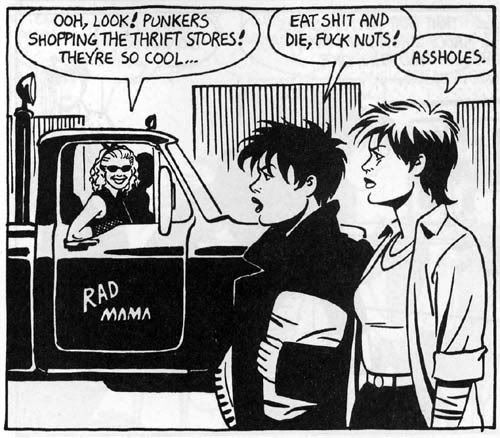 Hip hop and punk rock once inspired in me a theory: That one of the few positive side-effects of a frightening political climate and/or an economic crises is the emergence of new and inspired artforms. Well, this theory was pretty much proven false during the eight years of George Bush vs. The Axis of Evil, and if all that the current economy has to offer us artistically is the rise of the Auto-tune, then my theory is well and truly dead. That said, Jennifer de Guzman has written an article matching some of the major moments in comics to the socio-economic disasters that were simultaneously taking place in the real world. So maybe I wasn't so dumb after all...
Hip hop and punk rock once inspired in me a theory: That one of the few positive side-effects of a frightening political climate and/or an economic crises is the emergence of new and inspired artforms. Well, this theory was pretty much proven false during the eight years of George Bush vs. The Axis of Evil, and if all that the current economy has to offer us artistically is the rise of the Auto-tune, then my theory is well and truly dead. That said, Jennifer de Guzman has written an article matching some of the major moments in comics to the socio-economic disasters that were simultaneously taking place in the real world. So maybe I wasn't so dumb after all...
An excerpt from: Life in Comics: Can Creativity Save Comics from Troubled Times?
In the 1930s, while people were struggling with poverty and confronting the looming threat of fascism, Siegal and Shuster invented a (Super)man who did not have to struggle and who used his power for the benefit of humanity. In the early 1980s, when the economy was failing but the country had no clear moral battle on the horizon, alternative comics began to take on, as Charles Hatfield writes in his book Alternative Comics: An Emerging Literature, "the exploration of searchingly personal and at times more political themes."...What will troubled economic times bring us this time around?
To read the entire article, click here.
Inkwell Michelle's 30 Second Book Review
The Yiddish Policemen's Union by Michael Chabon Those who’ve read Chabon’s Pulitzer Prize winning novel, The Amazing Adventures of Kavalier & Clay, are familiar with his virtuoso writing style - it’s smooth, yet meaty - witty, but tender. He’s a natural and creative storyteller. In his latest novel, the sentence structure is consciously shorter to mimic the noir mystery genre - think Raymond Chandler. In Chabon’s foray into the pulp, hardboiled mystery featuring the down-at-heels detective, Meyer Landsman, we are introduced to a very different world, one in which the Jews after WW2 lost Israel and were forced to settle in Sitka, Alaska. Using the framework of a mystery opens a panoramic window to see into the private moments of a people whose very existence is threatened by deportation. Landsman bridges all levels of society as he investigates the death of a chess prodigy and son of the local, Orthodox mob boss. The murder is a thread that wends through the story, revealing and illuminating the secrets, fears, and bravery of an isolated and displaced people. Chabon is funny and melancholy, often in the same sentence, and the result is a literary treat that has an appeal across genres and genders.
Those who’ve read Chabon’s Pulitzer Prize winning novel, The Amazing Adventures of Kavalier & Clay, are familiar with his virtuoso writing style - it’s smooth, yet meaty - witty, but tender. He’s a natural and creative storyteller. In his latest novel, the sentence structure is consciously shorter to mimic the noir mystery genre - think Raymond Chandler. In Chabon’s foray into the pulp, hardboiled mystery featuring the down-at-heels detective, Meyer Landsman, we are introduced to a very different world, one in which the Jews after WW2 lost Israel and were forced to settle in Sitka, Alaska. Using the framework of a mystery opens a panoramic window to see into the private moments of a people whose very existence is threatened by deportation. Landsman bridges all levels of society as he investigates the death of a chess prodigy and son of the local, Orthodox mob boss. The murder is a thread that wends through the story, revealing and illuminating the secrets, fears, and bravery of an isolated and displaced people. Chabon is funny and melancholy, often in the same sentence, and the result is a literary treat that has an appeal across genres and genders.
Posted by
Inkwell Bookstore
at
11:28 AM
![]()
Labels: book reviews
It's A Small World After All
(Or: I Hope The Russians Love Their Bookstores Too)
 A recent report from Russia's Institute for Globalization and Social Movements tried to put a positive spin on its country's current economic crises, claiming, "The crisis has forced millions of Russians to search for a new meaning of life, and the discussion of social problems, as well as radical political and philosophical literature are very likely to cause an intensive interests on the part of readers now."
A recent report from Russia's Institute for Globalization and Social Movements tried to put a positive spin on its country's current economic crises, claiming, "The crisis has forced millions of Russians to search for a new meaning of life, and the discussion of social problems, as well as radical political and philosophical literature are very likely to cause an intensive interests on the part of readers now."
This was, of course, total chush' sobach'ya.
According to the Itar-Tass News Agency, "Experts who deal with the book publishing industry do not share this viewpoint. They claim that, on the contrary, the readers will now turn their eyes massively to the easy and entertaining genre. One way or another, the crisis has already affected the bookstores, and 30% to 45% of them are now facing the prospect of a shutdown."
Sound familiar, comrades?
For a sobering summary of Russia's bookselling woes, click here.
Wednesday, February 11, 2009
Gift Tips for the Bookish:
Toys Action Figures Collectible Figurines
Okay, if you're still shopping for Valentine's Day gifts at this point, you're either a super-devoted lover looking for the absolute perfect gift...or you're a procrastinating punk undeserving of love. Either way, we've got a few new book-related gift ideas, this time for the child in all of us. (Well, the Richie Rich-ish child in all of us. Just wait 'til you see the prices on some of these things!)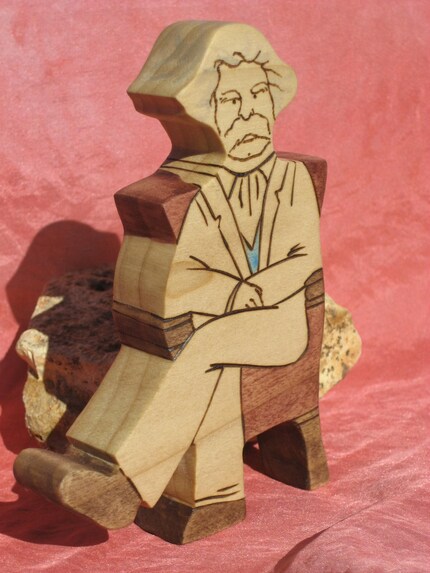

Homemade Mark Twain figure $50.00
Hand made Edgar Allan Poe-t Doll $175.00

Where The Wild Things Are bobble heads $11.99 each
Horton Hears A Who 9" vinyl figure $59.99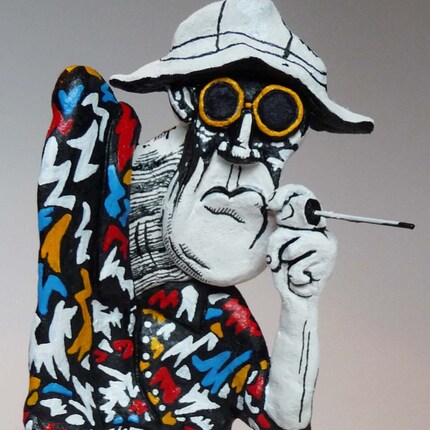

Hunter S. Thompson's Dr. Gonzo figure $80.00
Alice In Wonderland 4 figure set $38.99
Special thanks to Super Punch for 3 of the links!
Posted by
Inkwell Bookstore
at
2:13 PM
![]()
Labels: gift tips for the bookish
Book News, In Brief
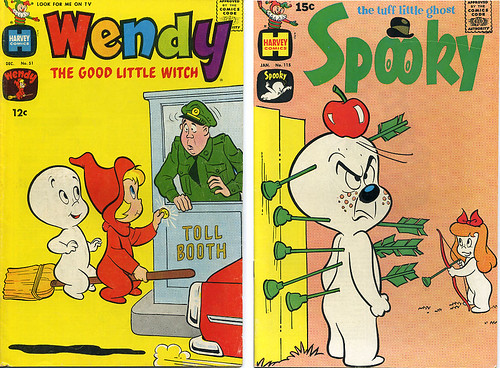 The MOCCA is currently running an exhibition celebrating the art of Harvey Comics, home to Casper the Friendly Ghost, Richie Rich, and Hot Stuff. For those of you not versed in The History of American Graphic Storytelling, these 'comics'* are noteworthy in that they eschewed literary pretensions in favor of fun. Très outré!
The MOCCA is currently running an exhibition celebrating the art of Harvey Comics, home to Casper the Friendly Ghost, Richie Rich, and Hot Stuff. For those of you not versed in The History of American Graphic Storytelling, these 'comics'* are noteworthy in that they eschewed literary pretensions in favor of fun. Très outré!
*Editor's note: 'Comics' was the crude term cro-magnon man used to describe graphic storytelling in the pre-Maus era.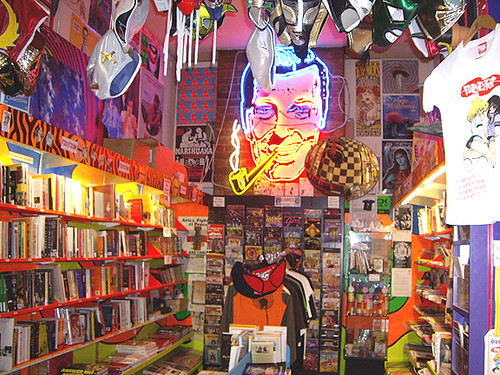 To hell with all those haughty booksellers patting themselves on the back for carrying The Catcher In The Rye. This is the sort of bookseller we ought to be celebrating during Banned Books Week: Polyester Books owner Paul Elliott has had books “stolen” by police, his store vandalised by feminists, books hurled across the room and received threatening phone calls...“I just think people might not agree with (the) content of books, but we are supposed to be living in a democracy,” he said. “Especially drug-orientated books. You can’t eat a book and get high.” LeaderNews.com has a brief bit on the badass bookseller.
To hell with all those haughty booksellers patting themselves on the back for carrying The Catcher In The Rye. This is the sort of bookseller we ought to be celebrating during Banned Books Week: Polyester Books owner Paul Elliott has had books “stolen” by police, his store vandalised by feminists, books hurled across the room and received threatening phone calls...“I just think people might not agree with (the) content of books, but we are supposed to be living in a democracy,” he said. “Especially drug-orientated books. You can’t eat a book and get high.” LeaderNews.com has a brief bit on the badass bookseller.
Related: Polyester Books has a webpage. Two new problems regarding Amazon's Kindle2 were revealed on Tuesday.
Two new problems regarding Amazon's Kindle2 were revealed on Tuesday.
1. Europeans can't buy 'em.
Via IHT.com: Mobile operators in Europe, which are eager to generate new revenue from sales of "content" like books, may be holding out for a larger share of the proceeds of book sales than Amazon wants to give them.
2. That 'friendly robot voice' that reads your e-books for you? It's probably illegal.
Via Galleycat: "They don't have the right to read a book out loud," said Paul Aiken, executive director of the Authors Guild. "That's an audio right, which is derivative under copyright law."
Related: PC World's 5 reasons the iPhone trumps the Kindle
Tuesday, February 10, 2009
Valentine's Link:
“Kissing,” as loosely defined by DC Comics' Heart Throbs, 1956-1961
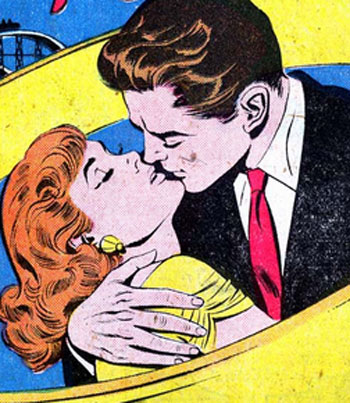 The Near-Miss
The Near-Miss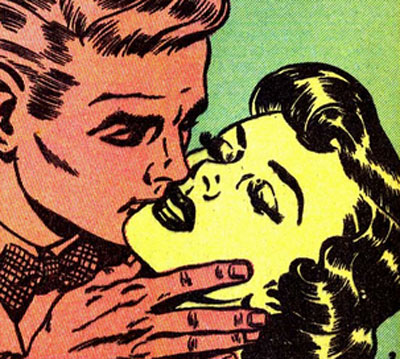 The Chi-Town Chin Suck
The Chi-Town Chin Suck
Hungry for more? Visit Chris' Invincible Super-Blog. Dude is a genius. Oh, and while you're there, make sure to check out his post, Romance Special: Getting a Date the Batman Way! 'Tis hilarious.
Posted by
Inkwell Bookstore
at
12:58 PM
![]()
Book News, In Brief
 The Guardian UK has a unique take on why e-books aren't bigger: There aren't enough 'illegal' copies floating around the net yet.
The Guardian UK has a unique take on why e-books aren't bigger: There aren't enough 'illegal' copies floating around the net yet. Related: Amazon.com's Kindle2. For a brief encapsulation of yesterday's unveiling, head on over to Publishers Weekly...you traitorous f**ks.
Related: Amazon.com's Kindle2. For a brief encapsulation of yesterday's unveiling, head on over to Publishers Weekly...you traitorous f**ks. Alright, enough about e-books. The 'coming soon' news that has me giddy is DC Comics' NYCCC announcement regarding their upcoming Lockjaw & the Pet Avengers mini-series. The world has waited far too long for an all-ages comic book featuring a teleporting bulldog, a dragon from another planet, and a frog Thor. (Well, I have, anyway.)
Alright, enough about e-books. The 'coming soon' news that has me giddy is DC Comics' NYCCC announcement regarding their upcoming Lockjaw & the Pet Avengers mini-series. The world has waited far too long for an all-ages comic book featuring a teleporting bulldog, a dragon from another planet, and a frog Thor. (Well, I have, anyway.) With their advertising dollars dwindling daily, newspapers and magazines are wondering if micropayments -- small payments made by readers for individual articles or other pieces of a la carte content -- will save them. Not likely, says Clay Shirky: The essential thing to understand about small payments is that users don’t like being nickel-and-dimed. We have the phrase ‘nickel-and-dimed’ because this dislike is both general and strong. The result is that small payment systems don’t survive contact with online markets, because we express our hatred of small payments by switching to alternatives, whether supported by subscription or subsidy. To read Shirky's whole piece, click here.
With their advertising dollars dwindling daily, newspapers and magazines are wondering if micropayments -- small payments made by readers for individual articles or other pieces of a la carte content -- will save them. Not likely, says Clay Shirky: The essential thing to understand about small payments is that users don’t like being nickel-and-dimed. We have the phrase ‘nickel-and-dimed’ because this dislike is both general and strong. The result is that small payment systems don’t survive contact with online markets, because we express our hatred of small payments by switching to alternatives, whether supported by subscription or subsidy. To read Shirky's whole piece, click here. This might be the most extreme example of customer service...ever. The Dayton Daily News reports: When Wittenberg University professor Dan Fleisch read on Amazon.com that Michel Cuhaci of Ottawa had received a flawed copy of Fleisch's book A Student's Guide to Maxwell's Equation, he posted a comment, identifying himself as the author and promising Cuhaci he would try to send the book via overnight courier. The only problem was, it was Christmas Eve...His next thought — he'd drive to Canada and deliver the $26 book himself. "I looked at my iPhone and there was this massive blob (snowstorm) over the whole Northeast," he said...(But) it appeared there'd be a break in the snow by morning. At 6 a.m. Christmas Day Fleisch was sitting in a plane at the Dayton airport waiting to head north. "I'm sitting there. The plane is fairly empty, and I think, 'Am I nuts?'" Click here to continue.
This might be the most extreme example of customer service...ever. The Dayton Daily News reports: When Wittenberg University professor Dan Fleisch read on Amazon.com that Michel Cuhaci of Ottawa had received a flawed copy of Fleisch's book A Student's Guide to Maxwell's Equation, he posted a comment, identifying himself as the author and promising Cuhaci he would try to send the book via overnight courier. The only problem was, it was Christmas Eve...His next thought — he'd drive to Canada and deliver the $26 book himself. "I looked at my iPhone and there was this massive blob (snowstorm) over the whole Northeast," he said...(But) it appeared there'd be a break in the snow by morning. At 6 a.m. Christmas Day Fleisch was sitting in a plane at the Dayton airport waiting to head north. "I'm sitting there. The plane is fairly empty, and I think, 'Am I nuts?'" Click here to continue.
Monday, February 9, 2009
Gift Tips for the Bookish: Board Games
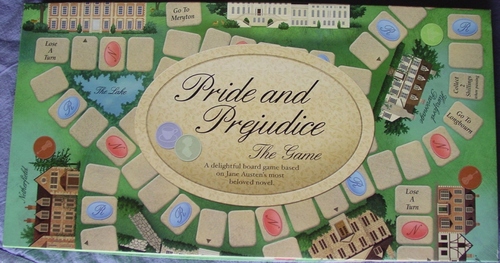 Just in time for Valentine's Day: The Pride and Prejudice board game!
Just in time for Valentine's Day: The Pride and Prejudice board game!
Posted by
Inkwell Bookstore
at
12:05 PM
![]()
Labels: gift tips for the bookish
Book News, In Brief
 Today's the day that Amazon is holding their highly publicized "secretive press conference," the topic of which is rumored to be the release of a new Kindle. I'll post any pictures and/or plot twists as they're revealed.
Today's the day that Amazon is holding their highly publicized "secretive press conference," the topic of which is rumored to be the release of a new Kindle. I'll post any pictures and/or plot twists as they're revealed. Just in time to make the new Kindle seem instantly outdated, Google has opened the e-book floodgates, offering 1.5 million downloadable books...free of charge! One wonders how Amazon -- once the proverbial 'cheapest game in town' -- will attempt to undersell free.
Just in time to make the new Kindle seem instantly outdated, Google has opened the e-book floodgates, offering 1.5 million downloadable books...free of charge! One wonders how Amazon -- once the proverbial 'cheapest game in town' -- will attempt to undersell free.
Inkwell Interjects
Brief backstory: While reading the following article this morning, I literally snarfed my coffee. I immediately wanted to respond to some of the more ludicrous statements made by the speakers quoted, but couldn't think of an even-handed way of doing so without basically reprinting the whole piece. Then it hit me: Why not re-print the whole piece, inserting my opinions as I went along?
So's I did.
All bold print is from the original article. All anorexic print and the accompanying illustrations are mine.
(Oh, and a special note to Brice Wallace, the author of the article:
Please don't sue me. I'm not criticizing you here. I'm only criticizing the folks you quoted.)
Technology is a new chapter for booksellers
By Brice Wallace
Originally published in The Deseret News on Friday, Jan. 30, 2009
Chalk up booksellers as another industry group challenged by new technology, but they were encouraged on Friday to jump aboard the tech train rather than compete with it.
A panel at the opening of the American Booksellers Association's winter get-together suggested that booksellers see technology — such as e-books — as an opportunity rather than a threat.
"We've all got to figure out how to use online to make our businesses work," Bob Miller, president and publisher of HarperStudio, part of HarperCollins Publishers, told a group of about 450 people in Salt Lake City.
Nan Graham, editor-in-chief of Scribner, said booksellers need to "figure out" their "territorial role" in the e-book industry. Panelists suggested a few ways booksellers can do that, including serving as guides and experts for their customers.
"All you need to do is shout-outs every day for things you think are of value. You all have expertise as influencers that you have to make use of online," Miller said.
"There is so much noise out in the marketplace and people are asking for direction — how to find the stuff that's worthwhile — and you guys do that," said Morgan Entrekin, president and publisher of Grove/Atlantic Inc. "You take ownership over your business, because you have a knowledge base of your local community. And I think that that's going to create great opportunity for you."
Panelists said all independent booksellers need to blog as a way to capitalize on their expertise. One bookseller said a video blog propelled a local wine seller to online prominence, expert status and huge sales for his business. "When we say you should blog, we really mean that a 20-year-old on your staff should," Miller said, evoking laughter from the audience.
Miller said such use of technology may not produce results quickly, but it also is not expensive. "It costs (virtually) nothing to do, but nobody's doing it," he said. Inkwell interjects: Er...actually, plenty of people are doing it. But the sad truth is that while blogging about one's favorite books is a wonderful way to waste work hours (take it from me!), it does little to increase the sales in one's store. The reasons why are simple. The reader is already online. How and where do you think they're going to impulse buy the book that you're shouting-out? (Answer: Online.) Even if the bookstore's blog links to their own online store, the average shopper is still going to take the extra five seconds to compare prices with Amazon. And until publishers offer the same discounts to indie bookstores as they do to Amazon, Amazon will always be able to offer the lower price. So while posting staff picks online might help to establish some sort of 'identity' for your store, it doesn't really do much to rake in the cash.
Inkwell interjects: Er...actually, plenty of people are doing it. But the sad truth is that while blogging about one's favorite books is a wonderful way to waste work hours (take it from me!), it does little to increase the sales in one's store. The reasons why are simple. The reader is already online. How and where do you think they're going to impulse buy the book that you're shouting-out? (Answer: Online.) Even if the bookstore's blog links to their own online store, the average shopper is still going to take the extra five seconds to compare prices with Amazon. And until publishers offer the same discounts to indie bookstores as they do to Amazon, Amazon will always be able to offer the lower price. So while posting staff picks online might help to establish some sort of 'identity' for your store, it doesn't really do much to rake in the cash.
Miller also said booksellers should not expect customers to pay full price for various versions of the same book. His preferred model is a customer buying a book and, while at the register, paying a little more for an e-book version and a little more for an audio book version. "Capture that sale in your store at the register," he said. "If we set up a battle between the digital and the physical, physical will lose."
Inkwell interjects: This is terrible advice. Record stores (remember them?) briefly tried this, and we all know how well that worked out. No one wanted to go to a store to purchase a song off of iTunes when they could do the same thing from home/work/via their cell phone. The same argument can easily be applied to e-books.
Oh, and about audio books -- they aren't going to provide miraculous monetary salvation to any bookstore. Last year, 'real world' retail sales made up only 27% of all audiobook purchases. And the numbers are dropping. It is foolish to try and sell 'new media' using the old methods.
A couple of panelists cited statistics to keep the e-book threat in perspective. Roxanne Coady, owner of an independent bookstore in Connecticut, said that if e-book sales doubled annually for the next five years, they would total $1.2 billion but still account for only 5 percent of total book sales.
Entrekin predicts e-books to be 3 percent to 10 percent of total book sales in five years. "I'm not quite so convinced that the e-book thing is going to tilt as wildly as some people in the industry are," he said. "Our customers are from six months old to 105 years old, and a large range of those people are not going to quickly move to digital or electronic." None of the panelists seemed worried about the long-term future of books and the shops where people buy them.
None of the panelists seemed worried about the long-term future of books and the shops where people buy them.
Entrekin said people worldwide "are getting more literate every day, every hour, every minute," and they will eventually turn to books because they are "where the repository and the discourse of our society are."
And bookstores "are the places that are beautiful, wonderful places to go to in the community," he said. "You know, we can't all live online all the time."
Inkwell interjects: I know that I'm coming off like an antagonistic assh*le here, but the fact is, the future of brick and mortar bookstores isn't pretty. To try and deny this in an effort quell the fears of folks making their livings working and operating them is just wrong. Spouting blue-sky bullsh*t like, "People worldwide are getting more literate every day, every hour, every minute, and they will eventually turn to books because they are where the repository and the discourse of our society are" and "Bookstores are the places that are beautiful, wonderful places to go to in the community," solves nothing. Pretty platitudes do diddly to help bookstores survive during a time of technological change and economic uncertainty. Previous ABA panels/seminars provided practical advice, but it seems like all that was offered here were simplistic suggestions and self-important self-affirmations. Hell, if that's all it takes, they could've just passed out Tony Robbins tomes and 'Hang In There' t-shirts and saved everyone a lot of time and money.
One more thing: Even if you disagreed with everything I interjected, please give the author of the original piece their proper click-through count by clicking here. Thanks!
Posted by
Inkwell Bookstore
at
12:07 AM
![]()
Labels: bookselling, Editorial



